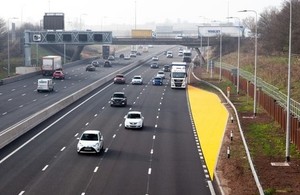Safety on smart motorways
Highways England media statement:

Smart motorway
Highways England has released the following statement to the media in relation to recent commentary about the safety performance of smart motorways:
Chief Highway Engineer Mike Wilson said:
Motorways in this country are among the very safest roads in the world. Highways England would never carry out a major improvement scheme without being confident that we would maintain or enhance this position.
Evidence indicates that smart motorways are helping to improve safety. The first nine of the latest generation of smart motorways have reduced casualty rates by more than 25 per cent.
Smart motorways are good for drivers, adding vital extra lanes to some of our busiest motorways and making journeys safer and more reliable. As with other roads, we monitor the safety performance of smart motorways and are rolling out enhancements to improve the road user experience.
Background
Driving on a smart motorway is simple and intuitive, and no different from on other roads. The main things to remember are:
- keep left unless overtaking
- do not drive under a Red X
- stick within the speed limit
- know what to do if you break down.
There is more information available on safe motorway driving on our website.
We are also working closely with recovery operators to operate safely on smart motorways; view our advice.
Smart motorways are designed with safety in mind, to be at least as safe as the conventional motorways they replace. Our evidence shows that they are reducing casualty rates:
- a risk assessment of the design for the latest generation of smart motorways estimated an overall 18 per cent reduction in risk compared to a conventional motorway
- the evidence indicates that, since opening, across nine ‘all lane running’ schemes the casualty rate has reduced by 28 per cent.
- this figure is based on three years’ data from two smart motorway schemes on the M25 and one year of data from seven other schemes across the country.
The hard shoulder is not a safe place - more than a hundred people are killed or injured on the hard shoulder every year, and people stopping on them unnecessarily is an issue. Smart motorways effectively eliminate this risk.
Smart motorways have places to stop in an emergency, including emergency areas, hard shoulders on junction slip roads and motorway service areas. These are a maximum of 1.5 miles apart - we have committed to reducing this distance on new smart motorway schemes (beginning construction in 2020) to one mile apart.
Feedback from road users show a clear majority feel confident driving on a smart motorway, and that they are safer and improve journey times. The watchdog, Transport Focus, recently published the Strategic Roads User Survey for 2018/19 and reported that 94% of people feel safe on motorways.
There has been comment in some media outlets about smart motorways increasing risk by 216%. This is incorrect – smart motorways were predicted to reduce safety risk compared to conventional motorways and evidence has demonstrated this prediction to be correct:
- the figure is an estimate made before the schemes were built and relates to one specific hazard relating to the risk associated with stopping in a live lane when there is little traffic.
- this is one of over 140 hazards that exist on a motorway when driving. Others include driving too fast, driver fatigue and the risks associated with hard shoulders.
- many of these hazards are reduced by the introduction of smart motorways; as we have always said the risk around stopping in a live lane increases, but this represents less than 5% of the overall risk of driving on a smart motorway.
- this same analysis showed that overall there would be around an 18% reduction in risk – this has been shown in practice with a reduced casualty rate with completed schemes of 28%
General enquiries
Members of the public should contact the Highways England customer contact centre on 0300 123 5000.
Media enquiries
Journalists should contact the Highways England press office on 0844 693 1448 and use the menu to speak to the most appropriate press officer.